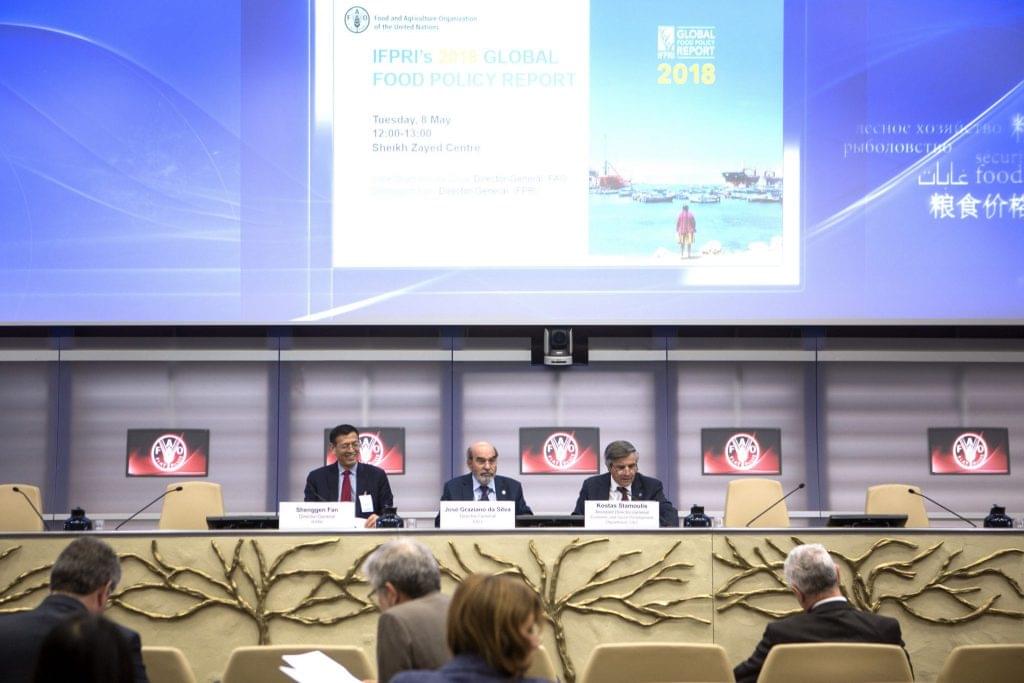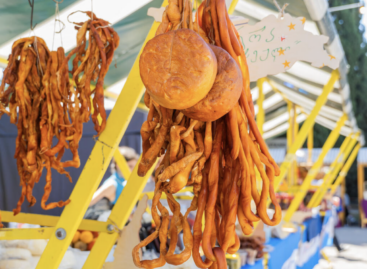FAO: “Think big” to make global food trade work for nutrition
Global trade in food is essential for all countries, but the world’s trade and regulation rulebook needs to be rebooted with an eye to bolstering trade in food that is healthy and nutritious rather than simply cheap, FAO Director-General José Graziano da Silva said today.

08 May 2018, Rome Italy – Launch at FAO of IFPRI’s Global Food Policy. The Global Food Policy Report is a major flagship report of the International Food Policy Research Institute (IFPRI). It reviews the major food policy issues, developments, and decisions of 2017, and highlights challenges and opportunities for 2018 at the global and regional levels. FAO headquarters (Sheikh Zayed Centre).
Facilitating the export of commodities to feed the world was a postwar imperative whose relevance has changed as “commodities became a synonym of industrialized processed food” and the threat of obesity is looming as large as that of hunger, he said. “Now things are changing completely.”
The popular farm-to-fork model of the food chain does not capture the complex realities of food systems, he said. “Most of the important things we do is beyond the fork.”
Food’s regulatory landscape, comprising laws, standards, production protocols, subsidies and disclosure protcocols, should be redesigned “to protect healthy food and not food in general,” Graziano da Silva said. “Promoting healthy food is part of FAO’s mandate and I’d even call it an obligation.”
He spoke at the Rome presentation of the 2018 Global Food Policy Report, published by the International Food Policy Research Institute (IFPRI). This year’s edition is focused on how to rein in growing discontent with globalization.
“We must go beyond production,” Shenggen Fan, Director-General of IFPRI, noting that key challenges in the pledge to end hunger include nutrition, employment, migration and the open sharing of knowledge and data.
“We need trade, as all countries, with no exception, need to exchange products to feed their population. The question is what kind of exchange,” Graziano da Silva said.
Noting a proliferation of trading tensions regarding fresh produce in particular, he suggested that it was archaic to “apply the same regulation on a product export from Brazil to Japan to something that is produced nearby to be sold in a farmer’s market in the same city.”
As a result, mass-produced processed foods, often full of extra saturated fats, salt and sugar, are actually advantaged by current rules.
“To assure that future food systems will provide healthy food for all people we’ll need a big change,” Graziano da Silva said, noting that this would entail much work by standard-setting bodies such as Codex Alimentarius. “We’ll need to think big if we really want to make this change.”
Related news
Corn 2026: soil moisture and hybrid choice may decide the season
🎧 Hallgasd a cikket: Lejátszás Szünet Folytatás Leállítás Nyelv: Auto…
Read more >Related news
Year-round consumer protection inspections – focus on examining discount prices and detecting customer deception
🎧 Hallgasd a cikket: Lejátszás Szünet Folytatás Leállítás Nyelv: Auto…
Read more >









